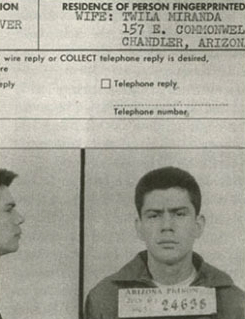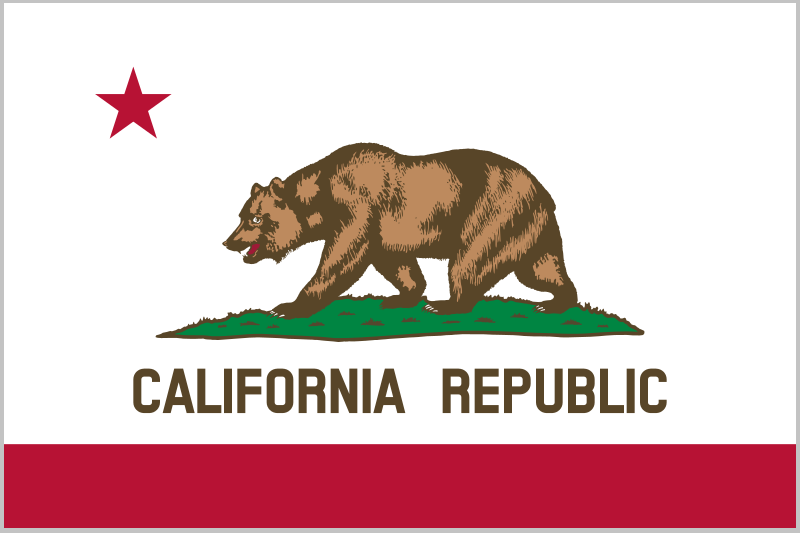|
The Right to Remain Silent
 JUNE 13, 1966 - In a 5-4 decision the United States Supreme Court ruled in the case of Miranda v. Arizona that police must inform suspects of certain rights before interrogating them. These rights include the right to remain silent and the right to legal counsel. JUNE 13, 1966 - In a 5-4 decision the United States Supreme Court ruled in the case of Miranda v. Arizona that police must inform suspects of certain rights before interrogating them. These rights include the right to remain silent and the right to legal counsel.
The case began on March 13, 1963, when Ernesto Miranda was arrested by Phoenix police officers for the kidnapping and rape of a 17-year-old girl. During a two-hour interrogation Miranda admitted to the crime and signed a typed confession. At trial Miranda's court-appointed attorney argued that the confession should not be admissible because Miranda had not been informed of his rights against self-incrimination. The objection was overruled and Miranda was convicted. The case was appealed, ultimately making its way to the highest court in the land, which agreed with Miranda and threw out the conviction. Following the Supreme Court's decision Miranda was re-tried and convicted based on witness testimony. He was sentenced to 20-30 years in prison, but was paroled after only serving 5 years.
In an ironic twist of fate Miranda was stabbed to death in a bar fight in Phoenix in January 1976 by two Mexican nationals. One of the suspects fled the country and was never caught, while the other invoked his Miranda rights and remained silent. No formal charges were ever brought in connection with Miranda's murder.
|
|
The Bear Flag Revolt

JUNE 14, 1846 - American settlers in the Mexican territory of Alta California revolted against the federal government and declared their independence from Mexico. The revolution lasted for 26 days during which only one battle was fought with a total of five casualties. Unbeknownst to the Californians, the United States government had already declared war against Mexico and American troops were in route, arriving on July 9, 1846. Once the leaders of the revolt learned the United States was claiming the area, they disbanded their "republic" and supported the American effort to annex Alta California. Although participants declared independence from Mexico, they failed to form a provisional government. Thus unlike the Republic of Texas, which existed as an independent nation for seven years following its revolution from Mexico, the Republic of California never exercised any real authority, and it was never recognized by any nation. The most significant contribution of the "California Republic" was the adoption of its flag as the basis of the modern state flag of California.

|
|
The Original "-Gate"
 JUNE 17, 1972 - Five men were arrested for breaking into the headquarters of the Democratic National Committee in the Watergate complex in Washington, D.C. and attempting to place illegal wiretaps. The FBI was able to trace cash found on the burglars to a slush fund used by President Richard Nixon's re-election campaign. Over the next two years investigations by the FBI and the Senate Watergate Committee revealed a massive cover-up that involved several members of the President's staff, eventually leading to the arrests and convictions of 43 people and the resignation of the President himself. The word Watergate has since become synonymous with cover-ups, and variations of the word are often derived to refer to other scandals, including Monica-gate, Climate-gate, and Trooper-gate. |
|
"You got the right to remain silent, so shut the *** up, ok!? You got the right to an attorney! If you can't afford an attorney, we will provide you with the dumbest *** lawyer on earth! If you get Johnny Cochrane, I'll kill ya!"
- Detective Lee Butters
Lethal Weapon 4
|
Side Note

Remember to celebrate Flag Day on June 14 by flying the Stars & Stripes. Flag Day honors the adoption of our flag on June 14, 1777.
|
Historical Archives
Read past editions of our This Week in History newsletter any time in our Archives.
|
|